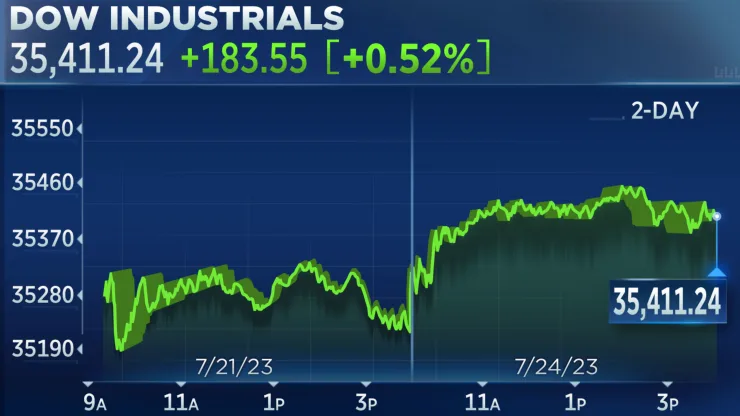
The Dow Jones Industrial Average rose Monday, notching its longest winning streak since February 2017, to kick off a busy week of key earnings reports and a major policy decision from the Federal Reserve.
The 30-stock Dow gained 183.55 points, or 0.52%, to 35,411.24 — posting an 11th straight day of gains. The S&P 500 rose 0.40% to 4,554.64. The Nasdaq Composite added 0.19% to 14,058.87.
Energy stocks led gains in the S&P 500, with the sector up about 1.7% after oil and gasoline futures touched a three-month high Monday. Chevron rose nearly 2% after the oil giant reported preliminary second-quarter adjusted earnings Sunday that topped analysts’ estimates.
Stocks continued to grind higher even after a 10-day advance for the Dow Jones Industrial Average. The blue-chip Dow eked out a 2.51-point gain on Friday, marking its longest rally since August 2017. For the week, the S&P 500 added 0.7%, while the Nasdaq Composite fell 0.6%.
“So far, there’s no evidence of a recession. So as long as there’s no evidence of recession, and I think the market will probably continue to melt up; people are chasing,” Steve Eisman, senior portfolio manager at Neuberger Berman, said on CNBC’s “Squawk Box.”
Still, some market participants expect a major week for earnings, as well as the Federal Reserve’s last policy meeting until September, could test the recent rally. The Fed is widely anticipated to raise rates by a quarter percentage point at the conclusion of its meeting on Wednesday. Traders will be listening to comments by Chair Jerome Powell to get a sense of the central bank’s position on what happens next as it tries to navigate a soft landing for the economy.
Wall Street is anticipating earnings results from some 150 S&P 500 companies this week, or about 30% of the broader index. Big tech earnings are on deck from Alphabet, Microsoft and Meta. It’s a major week for industrial companies and big oil as well.
Traders will also watch for the personal consumption expenditures index, the Fed’s preferred inflation gauge, which is due at the end of the week.





























